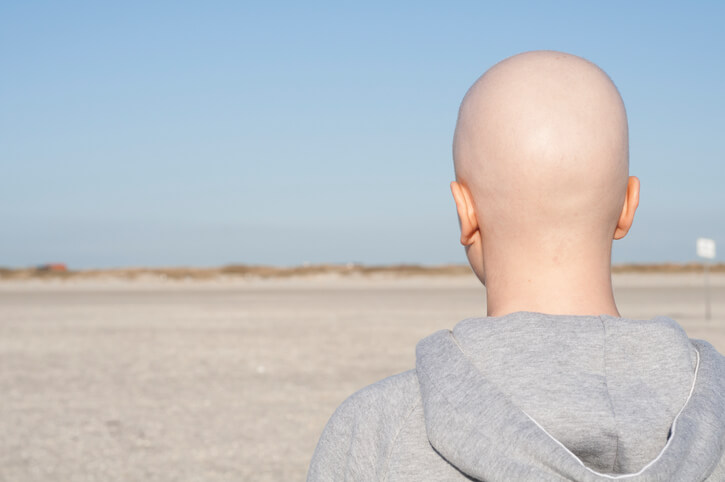Taxotere (docetaxel) is commonly prescribed to treat breast cancer — and like most chemotherapy drugs, it can cause hair loss. What makes Taxotere different, however, is that cancer patients permanent hair loss after they’ve finished chemotherapy. Independent studies like this recent United Kingdom breast cancer patient follow-up survey demonstrate these Taxotere chemo permanent hair loss findings.
In October 2013, UK researchers asked 134 cancer survivors who received Taxotere chemo in 2010 about their hair loss. Several respondents reported no eyelash, eyebrow, scalp, leg or nostril hair regrowth up to 3.5 years after completing Taxotere chemo. Researchers concluded that 10-15% of patients given Taxotere chemo treatments for breast cancer experience significant persistent scalp alopecia (baldness). Perhaps more worrying is the fact that respondents stated this long-term hair loss negatively impacted their quality of life. Indeed, researchers at the Clatterbridge Cancer Centre found this highly visible, permanent side effect could negatively affect long-term survival rates. So why were Taxotere chemo warnings in Europe mentioning the increased possibility of permanent alopecia omitted from U.S. marketing materials?
U.S. Taxotere Chemo Warning Labels Initially Downplayed Hair Loss Risks
The first U.S. Taxotere warning label listed hair loss as one potential side effect “associated with docetaxel administration.” Grouped with other symptoms like nausea, fatigue and infusion site reactions, many patients assumed their hair loss was only temporary. Over the years, the U.S. Food and Drug Administration updated docetaxel’s warning label to include additional Taxotere chemo complication risks. However, the FDA didn’t mention the possibility of significant permanent alopecia for patients receiving Taxotere chemo treatments until December 2015. Taxotere’s manufacturer, Sanofi-Aventis, updated its Canadian warning label in 2005 addressing permanent hair loss as well as several European countries. In 2006, Sanofi felt the low permanent hair loss risks didn’t necessitate a Taxotere chemo warning for U.S. consumers (according to Sanofi’s internal studies, only 3% of women experienced Taxotere-induced alopecia). However, other studies completed that year claimed alopecia occurred in 6% of Taxotere chemo patients.
American Women File Lawsuits Against Sanofi-Aventis
Frustrated American cancer survivors are now suing Sanofi. Plaintiffs claim the company should’ve included a U.S. warning label since Sanofi clearly knew about Taxotere chemo permanent alopecia risks. Instead, Taxotere’s drug packaging and warning labels included only vague, insufficient information about hair that “generally regrows.” Patients are also angry that doctors recommended Taxotere over other, equally effective drugs that don’t cause permanent baldness, like Taxol.
Victims say if they’d known that Taxotere chemo treatment could cause permanent hair loss, they would have chosen another option. These options often include more frequent treatments on a chemo regimen using less powerful drugs, including Taxol (paclitaxel). What’s more, Taxol doesn’t cause the same permanent hair loss risks as Taxotere. That’s true despite both drugs belonging to the taxane family. The psychological impact of persistent significant hair loss causes many patients to feel like their cancer never really went away.
Since so many Taxotere chemo patients experienced permanent hair loss, all pending lawsuits are now consolidated under MDL 2740. This means the presiding judge should rule on the issue sooner, ensuring all claimants receive equal and fair legal representation.
What You Can Do
If you experienced permanent hair loss after completing Taxotere chemotherapy, you may qualify for a cash settlement. Taking action to hold Sanofi accountable won’t stop other drug manufacturers from testing and launching new chemotherapy drugs. However, it will make Sanofi and others think twice before putting their own profits above disclosing all potential side effects to patients. After all, Sanofi listed persistent alopecia as a known possible side effect for European patients. Why should U.S. patients receive different side effect warnings? This deceptive practice robbed thousands of cancer patients of the ability to make an informed decision when choosing their treatment.
If you still don’t have full hair regrowth months or years after completing treatment, we can help you hold Sanofi accountable. Fill out your free claim evaluation now to speak to an attorney about getting the justice and compensation you deserve. Once you’ve submitted your information, an experienced lawyer will call you to discuss your compensation options.
Related: How Taxotere Permanent Hair Loss Affects Cancer Survivors
Mandy Voisin
Mandy Voisin is a freelance writer, blogger, and author of Girls of the Ocean and Star of Deliverance. As an accomplished content marketing consultant, mom of four and doctor's wife, Mandy has written hundreds of articles about dangerous drugs and medical devices, medical issues that impact disabled Americans, veterans' healthcare and workers' compensation issues since 2016.

